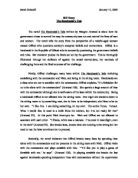Commander
The Commander is a fairly confusing character because it is never completely clear whether he truly cares for Offred and believes in the Gileadean regime or not. The Commander slowly becomes more comfortable with Offred and begins to treat her as a daughter as the novel progresses. By meeting with Offred at night he is trying to make her life more “bearable” (Atwood 236). Also, “[w]hat he wants is intimacy” from Offred as he asks to talk to her every night and asks for her opinion on the Gileadean regime (Atwood 264). It seems as though he genuinely likes and cares about Offred. However, he also suggests to Offred that he does not believe women can add or write. Clearly, he agrees with Gilead’s perspective on women’s roles in society. He also shows Offred off to the other men at Jezebel’s, often treating her more as an object than as a person. Finally, he demonstrates that he has no true concern for Offred’s safety when he continues to ask to meet with her at night although he knows that the previous handmaid, who he met with as well, hung herself after Serena found about her relationship with the Commander because she was so afraid of the possible punishment for her actions. Ultimately, Offred describes their relationship best when she thinks, “ If your dog dies, get another” (Atwood 236). The Commander does seem to feel a certain amount of affection toward Offred, however it is more the type of affection you would show a pet than a person. Not to mention, that, to the Commander, Offred is easily replaceable. In the end, Offred’s observation is proved to be true when the Commander, not knowing that the Eyes taking Offred away are actually helping her, says nothing to try to help Offred when the Eyes take her away or when Serena plans on punishing her for her relationship with him.








